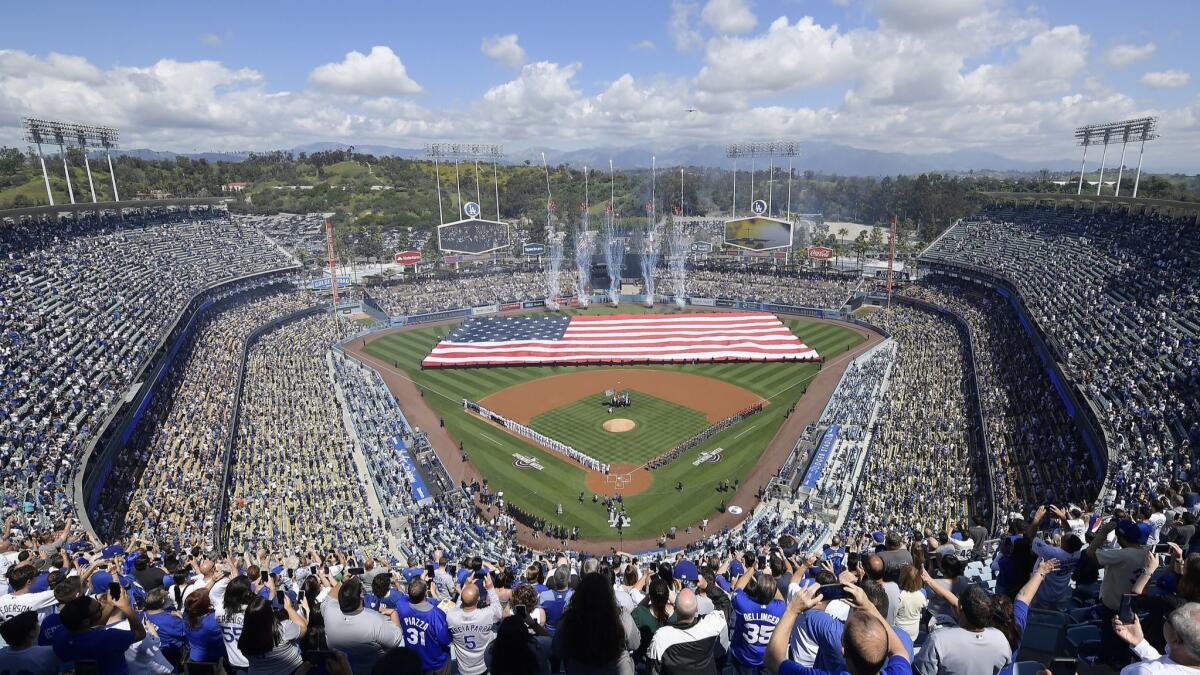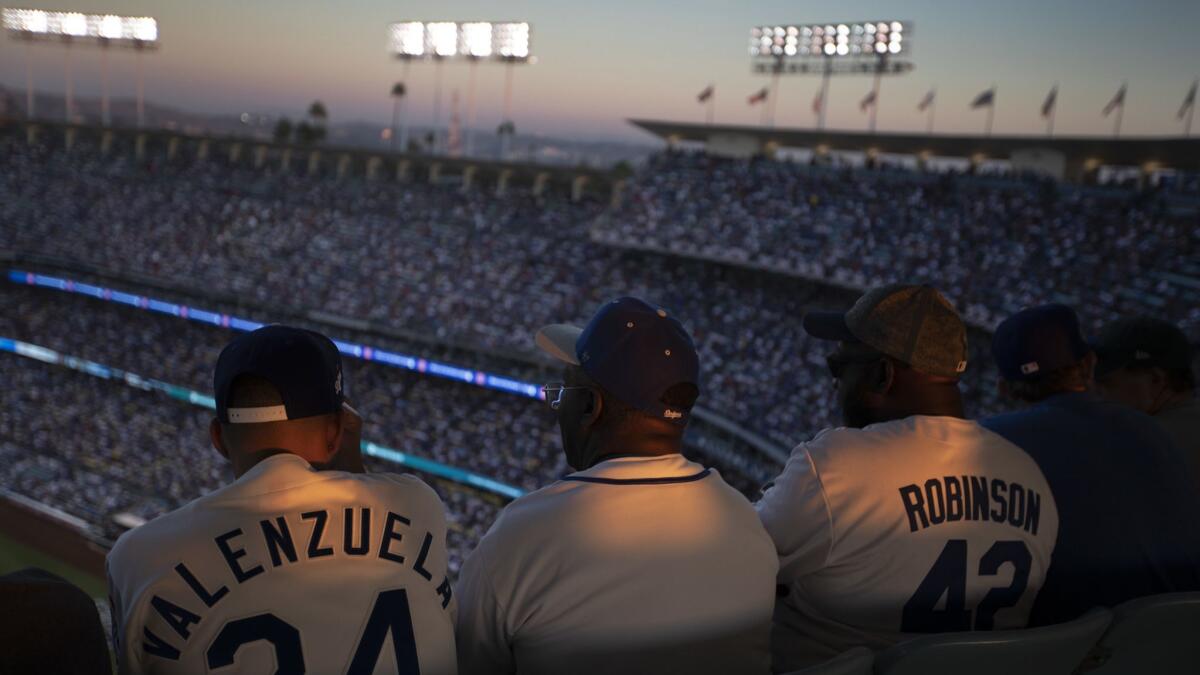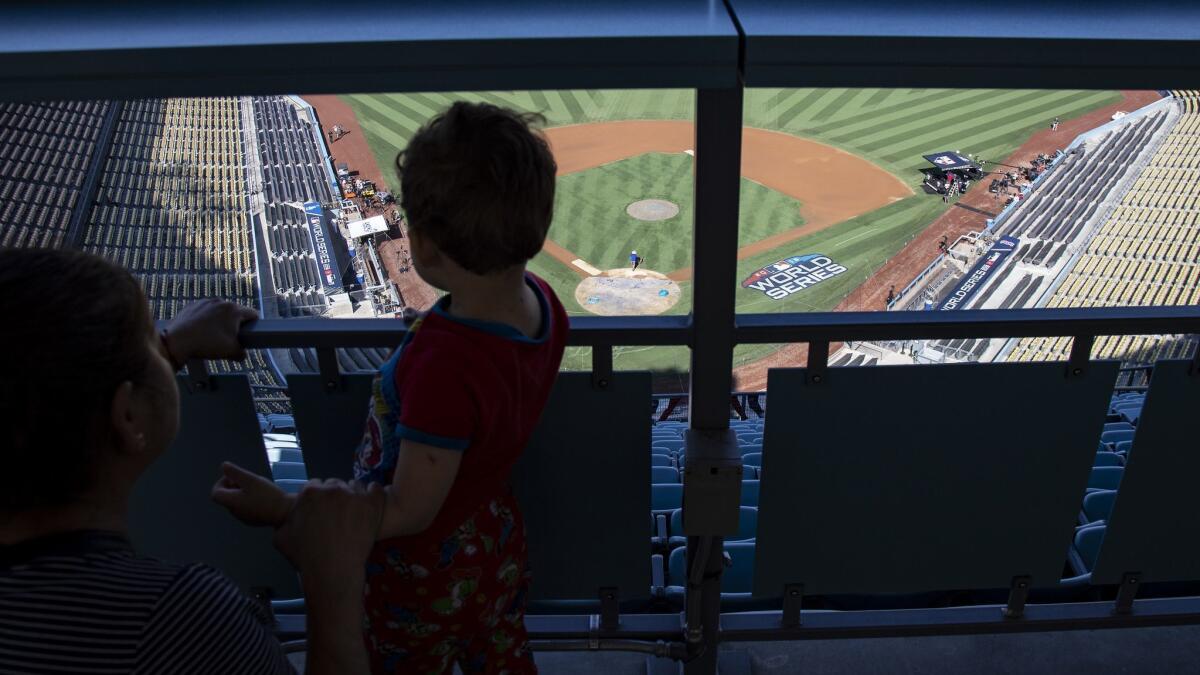Dodgers hope to bolster bottom line by cutting out ticket brokers

The day after the Dodgers clinched the National League West championship last October, the team issued a news release.
“The Los Angeles Dodgers announced sellouts for all possible National League Division Series and National League Championship Series games at Dodger Stadium,” the team said. The Dodgers advised fans without tickets to buy from “trusted team partners on the secondary market.”
However, on the day before the Dodgers played their final home game of the NLCS, the Dodger Stadium scoreboard advertised tickets for sale: “Game 5 Tomorrow at 2:05 p.m. Tickets starting at $22.”
On the Dodgers’ website, $22 tickets were offered in eight seating categories, with tickets at various prices in about three dozen seating categories. The previous day, those $22 seats were priced from $98 to $112 — along with a $100 standing-room ticket, no seat included.
The situation marked an awkward conclusion to the first season in which, largely unknown to fans, the team controlled much of the secondary ticket market.
The Dodgers had stripped brokers of their ability to buy season tickets, with the team betting it could make more money by cutting out the middle men. Four brokers filed a joint lawsuit against the Dodgers, alleging the team had reneged on its promises. And, after the Dodgers realized they had set prices on the resale market too high at times, they reversed course so drastically that some fans claimed the team had devalued their season tickets.
The combination of sharply rising prices for season tickets and the unfavorable climate for reselling them have left ticket holders wondering whether to renew after the 2020 season, when Dodger Stadium will play host to the All-Star game. Mike Rizzi considers his season tickets a luxury, not an investment, but even then he isn’t sure they’re worth it.
“I’ll buy the tickets for next year,” Rizzi said, “and I’m done.”
The Dodgers and other teams generally had enjoyed a mutually beneficial coexistence with ticket brokers. The team would sell them season tickets, cashing in before the season started and counting all the tickets sold – whether used or not – in its attendance. The brokers took the financial risk – they might have to sell some tickets at a loss or not at all – but developed a relationship with customers that trusted the brokers could get tickets for any game or concert in town.
Over the course of the regular season, brokers say, they might lose or make a little money. The big profit rolls in, they say, when the Dodgers play deep into the postseason.
For the 2017 World Series, prices skyrocketed. With fans desperate to witness the Dodgers’ first World Series games since Ronald Reagan was president, the resale price of a ticket often exceeded the face value by hundreds of dollars.
The Dodgers noticed. The lowest price of a World Series ticket sold by the team was $166. By the morning of Game 7, the lowest price on some resale markets was more than $1,000. For tickets in prime locations, the disparity between face value and market value could be greater.
That meant millions of dollars went into the pockets of brokers, not the Dodgers. So after the 2017 season, the Dodgers decided to cut out the brokers.
Ron Holt was one of them. He grew up in the San Fernando Valley, rooting for the Dodgers. He worked for his uncle’s ticket brokerage before starting his own in 1990. What was once a one-man business had grown to a company with 24 employees called 714 Tickets.
Early in 2018, with the Dodgers coming off their first World Series in three decades, Holt said he hired additional staff in anticipation of increased demand for tickets. He had bought hundreds of season tickets every year and resold them. But weeks before the start of the season, a team representative called to inform him the Dodgers would no longer sell him tickets. The representative offered no explanation, Holt said.
“They couldn’t get off the phone fast enough,” Holt said.
::
The Dodgers are far from the only major league team to dump the brokers.
Four years ago, the Kansas City Royals identified and canceled 227 broker accounts, said Mike Bucek, the team’s vice president of marketing and business development. The team eventually reached an exclusive agreement with Dynasty Sports and Entertainment, a so-called consolidator that provides proprietary market data to help determine the optimal price for the tickets and lists the tickets on targeted resale sites.
Bucek estimated about two-thirds of major league teams have such a partnership – with the consolidator sometimes acting as an exclusive broker and other times furnishing real-time market research so the team can adjust prices on a day-to-day basis. (The Angels have sharply reduced – but not eliminated – sales to brokers. They do not use a consolidator.)

The Royals’ season-ticket revenue has not increased, Bucek said. Teams that once embraced selling season tickets to brokers – cash in and move on – now prefer to sell directly to fans, even one ticket at a time. Teams say they can guarantee the tickets they offer are not fraudulent.
The teams also can use the email and cell phone used to purchase a ticket to target customers for future ticket, merchandise and concession sales. The team gets none of that data if a broker sells the ticket.
The Dodgers play in the largest stadium in baseball, with capacity listed at 56,000 seats. The ticket brokers that filed suit against the Dodgers alleged the team had about 35,000 season-ticket holders and “over half” were brokers. Curtis Autenrieth, president of the California Assn. of Ticket Agencies, said a Dodgers ticketing executive told him about 10,000 season tickets were held by fans, the rest by brokers.
The Dodgers twice declined on-the-record comment for this story, once before the suit was filed and once since then, when The Times presented a list of questions. The Dodgers cited the ongoing litigation in declining comment the second time and issued this statement: “The relationship between ticket issuers, such as sports teams and the promoters of live events, and the secondary ticket market is constantly evolving. Every major league team is working to find what works best in its market, as are we. Our objective is to make sure that Dodger tickets continue to be an outstanding value in our market and throughout baseball.”
When the Dodgers booted the brokers, they agreed to a deal with Eventellect, a Texas-based rival of Dynasty. Eventellect works with teams in MLB, the NBA, NFL, NHL and MLS, according to co-founder Patrick Ryan.
“Generally speaking,” Ryan told the Sloan Sports Analytics Conference last year, “you want to be able to create a market by having some controls, without other people compromising your pricing strategy.”
The Dodgers and Eventellect work to find the optimum price for Dodgers tickets on the resale market. The average resale price for a Dodgers ticket fell from $92 at the start of last season to $83 at the start of this season, according to TicketIQ, a national ticket aggregator.
Those last-minute $22 tickets for the NLCS last year reflected an original resale price too high for the market, a team official said on condition of anonymity. The Dodgers ultimately decided that, at least for that NLCS game, getting fans into the ballpark was preferable to enforcing “pricing integrity,” industry jargon for maintaining high prices even at the risk of empty seats, so as not to condition fans to expect a price drop as game day approaches.
::
The season ticket might be losing its luster because fans can buy the tickets they want to the games they want with a click or two, but any fan still willing to pay thousands of dollars for a ticket to every game remains a customer teams aim to treat well.
“If a field-box holder who paid $100 is sitting next to someone who paid $25 because that’s what the market said, we worry about that dynamic,” Tim Zue, executive vice president and chief financial officer of the Boston Red Sox, told the Sloan conference.
By cutting out the brokers, teams can essentially establish a minimum price for tickets. A broker might sell a $20 ticket for $6 because the customer might later buy a Bruno Mars or Taylor Swift ticket from him at a nice profit. A team has no such incentive to slash its price.
“Now those tickets that might have sold for $6 are holding their value for $15 or $20,” the Royals’ Bucek said, “so you’re providing more value for season-ticket holders.”
Some Dodgers season-seat holders have been startled by what they see on the secondary ticket market this year: a flood of cheap tickets, at least for the less popular games, at a time when the Dodgers control most of the ticket supply.
“They’re doing what the brokers were doing,” Autenrieth said, “that they were trying to stop the brokers from doing.”
In one section of Dodger Stadium for a game this season, seats sold to season-ticket holders for $32 per game were available on StubHub for $14 in a block of 14 seats — an indication the seats were offered for sale by the Dodgers, not a fan. In another section, seats sold to season-ticket holders for $40 a game were available on StubHub for $16 for one game in a block of 15 seats. Customers could buy any number of tickets within the block.
The StubHub service charge to fans selling tickets ranges from 10% to 15% of the resale price, company spokeswoman Alison Salcedo said. As a result, a ticket holder could have to absorb that fee to match the already depressed resale price offered by the team, working with its ticket consolidator.
Sign up for our daily sports newsletter »
The Dodgers’ 2019 ticket contract prohibits customers from reselling tickets “except as expressly permitted by the Venue or Major League Baseball.” The Dodgers’ season-ticket interest form asks prospective buyers whether they plan “on using these tickets for a business purpose” and also asks how many games they plan “to personally attend.”
Richard Bustos said that when he purchased season tickets, the Dodgers asked him to confirm he was not a broker, or buying on behalf of one. He said the team representative would not say how many tickets he could resell before the team might consider him a broker and revoke his tickets.
“It makes me think a little bit before renewing,” Bustos said.
Brian Cohee, who holds season seats on the loge level, said a Dodgers representative told him the team was trying to eliminate brokers who would flood the resale market with cheap tickets.
“If it’s the Dodgers actually doing that and selling them while raising [season] ticket prices?” Cohee said. “That would be concerning for sure.”
The Dodgers this year decided to allow season-seat holders to exchange unwanted tickets for tickets to another game, an alternative for fans concerned about selling at a loss. The team could then offer those unwanted tickets cheaply on the resale market. For the Dodgers, with more seats to sell than any other team in baseball, a cheap ticket price could lure a fan who would then pay full price on parking, concessions and merchandise.

Michael Wenkart said he bought his loge-level tickets to ensure he could purchase World Series seats at face value. It makes no sense, he said, for a fan to buy season seats, go to the marquee games, and then complain about not getting good resale value for the lousy games.
“I know I’m going to get maybe 50 cents on the dollar for a Tuesday game against the Diamondbacks,” he said.
Ryan, the co-founder of the Dodgers’ ticketing partner, spoke with The Times last year, before the brokers filed suit. He said eliminating discount tickets would be unwise.
“You’re only going to hurt your attendance and the future generation of fans, who might only get exposed via that discount,” he said. “I just think that any team wants its discount strategy to be consistent and orchestrated.”
Such a strategy could be jeopardized, he said, with too many brokers undercutting one another. However, he said, he does not advise teams to cut off all brokers.
“We encourage teams to maintain good relationships with large local resellers,” Ryan said.
The Dodgers decided not to maintain a relationship with any reseller. The four brokers who filed the lawsuit – Holt, one based in Connecticut, one based in New York and one based in Canada – claimed the team, in deed and in word, treated them as partners and promised the opportunity to renew their tickets each year. The Dodgers denied they had extended any such agreement to the brokers.
In their complaint, the brokers included emails showing that, on at least two occasions – a Vin Scully appreciation day in 2016 and a Cody Bellinger bobblehead day in 2017 – then-Dodgers vice president of ticket sales David Siegel provided advance notice so the brokers could raise their prices before the announcement of each promotion.
The Dodgers asked the court to assume the brokers’ allegations were correct and then throw out the case anyway, because no law would have been broken. The judge denied the request.
The suit is more than a year old, with no sign of resolution. The Dodgers are two months into their bid for a third consecutive World Series appearance – and first World Series championship since 1988.
The Dodgers stewed as brokers pocketed the profits in 2017. They overpriced the market themselves in 2018. If the Dodgers do advance to the 2019 World Series, the team hopes the third time will be the charm, on the field and on the bottom line.
Follow Bill Shaikin on Twitter @BillShaikin
More to Read
Are you a true-blue fan?
Get our Dodgers Dugout newsletter for insights, news and much more.
You may occasionally receive promotional content from the Los Angeles Times.







